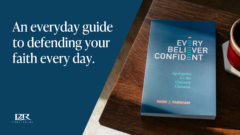You can’t read the first five books of the Old Testament and fail to conclude that God takes worship seriously. But then, you can’t observe the lay of the evangelical land today and fail to conclude that many churches do not take worship seriously. While granting there is a great and necessary difference between Old Testament worship and its New Testament counterpart, we should still wonder: How did we get from the tabernacle to the stormtrooper dance? How did we get from sober, serious worship to the lowest depths of megachurch tomfoolery? Why is it that so many churches seem locked in a race to the absolute bottom?
Worship is not a right, but an immense, costly privilege won for us through the blood of Jesus Christ.
As I follow the five-day Bible reading plan, I’ve begun in Genesis, made my way through Exodus and Leviticus, and am now well into Numbers. These early books of the Bible have a lot to teach us about worship. The first and foremost lesson is that worshiping God is an immense privilege. Though we were created to worship God, we turned our backs on him and, in our willful disobedience, became worshipers of other things. Rather than having hearts fixed on God, we have allowed other things to gain undue prominence in our lives. So now, instead of pursuing the Creator, we pursue created things. We run around looking for satisfaction in sex and money and power, we bow down to idols of wood and stone or set our hearts on gods of green and gold. God could have left us in this state. He had no need to intervene. But he did, and by saving us he has restored us as worshipers of God. We can now do the very thing for which we were created. Worship is not a right, but an immense, costly privilege won for us through the blood of Jesus Christ.
If the first lesson is the privilege of the worship, the second is the necessity of worshiping God in God’s way. Though we are saved, we are still laced with sin. We have no reason to trust our own instincts when it comes to worship. Rather, we must learn from God what it means to worship him rightly. We see this in the Bible’s earliest books. In exacting detail, God provides the layout, the measurements, and the materials for his tabernacle. He describes exactly who is to perform which functions and how they are to perform them. God will allow and invite worship, but this worship must be done on his terms.
No sooner does worship begin, then God shows the consequences of failing to take it seriously and to obey his instructions fastidiously. God appoints Aaron and his sons as priests and they are consecrated to that task. But almost immediately Nadab and Abihu decide they will worship in their own way instead of God’s. And in an instant, God strikes them down. Their offense is so egregious that they are put to death, their bodies hauled away in disgrace, and even family members forbidden from mourning them. And in all this no one charges God with wrong. Genesis, Exodus, Leviticus, and Numbers teach us a lot about God’s perspective on worship.
As the theocracy of Israel gives way to the global New Testament church, worship necessarily changes in very significant ways. Our worship no longer points forward to the coming of a promised Messiah, but looks back in faith to the birth, life, death, and resurrection of Jesus. Our worship is no longer centered in one temple in a specific geographic location, but takes place in a million local churches spanning one end of the earth to another. Our worship is no longer the worship of one chosen ethnic race, but the worship of representatives of all nations, tribes, and tongues.
But what remains constant is that worship is still a privilege given to us by God and that when it comes to the elements and even the style of our worship, we still cannot trust our own instincts. Instead, we must look to God’s instructions and then obey them. If God was so scrupulously prescriptive in the Old Testament era, is it likely he would just leave it all to our discretion in the New? If worship of God was so serious and so counter-culture in the Old Testament, is it likely he would want it to be light and playful and culture-mimicking in the New? No, God still speaks and God still tells us how we are to worship in ways that are serious and distinct and pleasing to him.
How are we to worship? What are we to do when we gather? In short, we’re to read the Bible, preach the Bible, pray the Bible, sing the Bible, and see the Bible. Our worship is to proceed from the Bible, to depend upon the Bible, and to be soaked in the Bible. Our desperate need, and our great privilege, is to know and proclaim God’s Word. Yes, we have some freedom within these parameters, and no, the worship of a church within suburban Canada will not be identical to the worship of a church in rural Papua. But the purpose of our gatherings is not to entertain people or to meet the ever-changing and ever-fickle felt needs of the unsaved or even the saved. Rather, it’s to expose them to the Bible, to feed them with the Bible, to encourage them with the Bible, to equip them with the Bible, then to send them out to a lost and hurting world to proclaim the Bible. Anything that serves a different purpose or fails to meet these purposes is less than God expects and less than God deserves. Worship, it turns out, is serious business.










